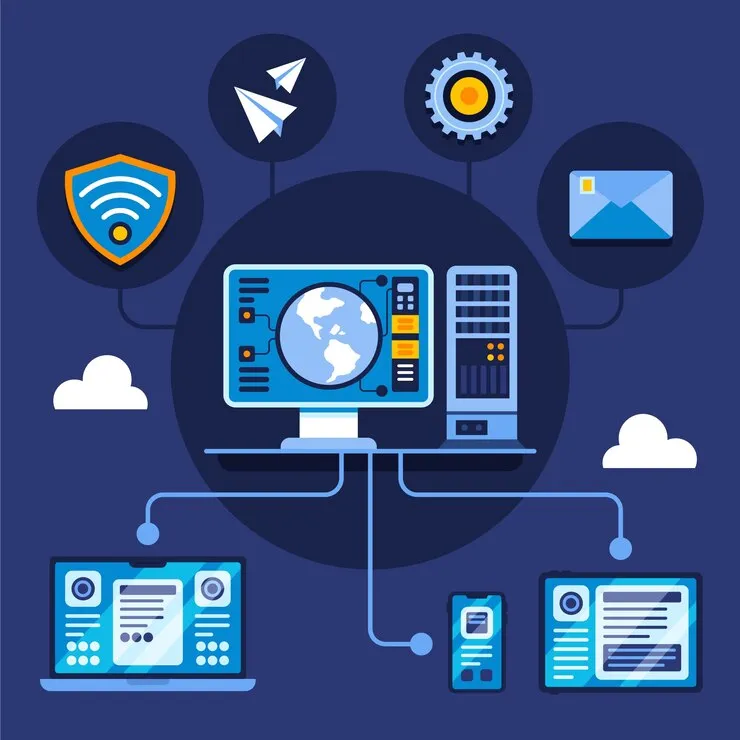Are you looking for a comprehensive guide to rotating proxies and cybersecurity?
This article can provide you with all the knowledge you need to make informed decisions about proxies and how they can benefit your security.
We’ll discuss the different types of proxies, setting up a rotating proxy, security protocols, common uses, and best practices.
Read on to learn more about why and how you can use rotating proxies for cybersecurity.
→ Some other articles by Resiprox:
– https://resiprox.com/duckduckgo-and-residential-proxies/
– https://resiprox.com/residential-proxies-for-rakuten/
– https://resiprox.com/residential-proxies-for-igaming/
– https://resiprox.com/residential-proxies-for-microsoft-edge/
– For more reading, visit our blog!
Key Takeaways
- Rotating proxies provide increased privacy, security, and anonymity by automatically changing IP addresses over time.
- They help bypass geo-restrictions and improve website loading speeds.
- Rotating proxies offer improved anonymity and the ability to access geo-restricted content without being tracked.
- There are different types of proxies available, such as shared proxies, dedicated proxies, forward proxies, and reverse proxies, each with their own advantages and disadvantages.
What Are Rotating Proxies
Rotating proxies are a type of proxy server that changes automatically over time. They’re designed to provide users with an increased level of privacy, security, and anonymity when browsing the internet.
This is accomplished by assigning a new IP address to a user at certain intervals. The IP address is taken from a pool of IP addresses and can be changed based on pre-defined rules or on-demand. This helps to prevent malicious actors from tracking users’ online activities, as they’re unable to pinpoint a single IP address.
Additionally, rotating proxies can help users bypass geo-restrictions, access blocked content, and improve website loading speeds. In short, rotating proxies provide a secure and reliable way for users to protect their data and maintain their online privacy.
Benefits of Rotating Proxies
Using rotating proxies can provide numerous benefits to enhance your cybersecurity.
These benefits include improved anonymity, reduced risk, and increased privacy.
Improved Anonymity
By utilizing rotating proxies, you can significantly improve your online anonymity. Rotating proxies are an effective security tool for hiding your IP address, which helps protect your personal data and location from malicious actors.
Here are three key advantages of using rotating proxies for improved anonymity:
- You can access geo-restricted content without being tracked.
- You can hide your online activity and remain anonymous.
- You can switch IP addresses quickly and easily without any technical knowledge.
Rotating proxies for cybersecurity are a great way to increase privacy and security while browsing the internet, as they provide multiple layers of protection. They also allow you to access websites and services that would otherwise be blocked, giving you a wider range of content to explore.
Furthermore, the rotating proxy system is quite easy to set up and use, making it a great choice for those looking to stay secure online.
Reduced Risk
With rotating proxies for cybersecurity, you can reduce the risk of cyber attack and ensure your online safety.
Rotating proxies are a way to mask IP addresses, which helps protect you from malicious activity such as DDoS attacks, identity theft, and other malicious activities. By using a rotating proxy, your IP address is randomly assigned with each request, making it harder for malicious actors to track your activity.
Additionally, rotating proxies for cybersecurity make it easier to access geographically-restricted content, as your IP address is constantly changing and appears as if it’s coming from a different location. This can be beneficial for those who need access to certain websites that are blocked in their home country.
Furthermore, rotating proxies can provide a layer of privacy and anonymity, as your IP address won’t be linked to your online activity.
All these features make rotating proxies an ideal tool for safeguarding your online security.
Increased Privacy
Rotating proxies offer increased privacy by masking your IP address and making it appear as if your online activity is coming from a different location. This increases your anonymity while browsing the web, allowing you to protect your identity and data from malicious actors.
Here are some key benefits of using rotating proxies:
- Bypass Geographical Restrictions: Rotating proxies can help you bypass geo-restrictions, giving you access to content that might otherwise be unavailable in your region.
- Secure Online Transactions: Proxies can help you securely make online purchases and payments without worrying about your data being intercepted by hackers.
- Hide Your Online Activity: By masking your IP address with a rotating proxy, you can browse the web without leaving any traces, allowing you to remain anonymous and protect your privacy.
Types of Proxies
When it comes to using proxies for cybersecurity, there are two main types: shared proxies and dedicated proxies.
Shared proxies are more cost-effective but have less privacy.
Dedicated proxies provide more privacy but are more expensive.
Both types of proxies have their own advantages and disadvantages, and it’s important to understand them before making a decision.
Types of Proxies
There are two main types of proxies: forward proxies and reverse proxies.
Forward proxies act as an intermediary between a user and the Internet, allowing the user to hide their IP address and access websites anonymously.
Reverse proxies, on the other hand, are used by web servers to direct traffic to the appropriate place.
Here are three types of proxies you should familiarize yourself with:
- Anonymous proxies: These proxies hide the user’s IP address but don’t encrypt the data sent over the internet.
- Transparent proxies: These proxies act as both an intermediary and a gateway, allowing a user to access the web without revealing their IP address but also allowing the web server to verify their identity.
- Elite proxies: These proxies offer the highest level of privacy and security, encrypting data sent over the internet and hiding the user’s IP address.
Benefits of Proxies
Building on the previous discussion, you can reap many benefits from using proxies, such as increased privacy and security, anonymity, and bypassing restrictions.
Proxies offer added protection from intrusive online tracking, shielding your device from malicious attacks, and allowing you to access content that would otherwise be restricted. By masking your IP address, proxies allow you to browse the web anonymously and securely.
Proxies also provide a way to access geo-blocked content, allowing you to access websites or streaming services that may be unavailable in your country. Furthermore, proxies provide an extra layer of encryption, ensuring that all web traffic is secure and private.
As such, proxies can be an effective tool for protecting your online privacy and security.
Setting Up a Rotating Proxy
Setting up a rotating proxy is easy; just follow these steps.
First, register for a rotating proxy service. This will give you access to a pool of IP addresses that are rotated on a regular basis.
Second, configure your web browser or device to use the rotating proxy service.
Finally, connect to the proxy service by entering your credentials. This will ensure that your connection is secure and your IP address is hidden.
To maximize security, use a VPN in conjunction with the rotating proxy service. Doing so will provide an additional layer of protection against potential threats.
Following these steps will ensure that you’re using a secure and reliable rotating proxy service.
Security Protocols
Once you have your rotating proxy set up, it’s important to use security protocols to ensure that your data is kept safe.
The most common security protocols used for this purpose are SSL/TLS, SSH, and IPSec.
SSL/TLS is a cryptographic protocol used to secure communications over the internet. It ensures that data is encrypted and authenticated, and also provides message integrity.
SSH is a protocol used to establish a secure connection between two computers. It allows for secure remote login, secure file transfer, and port forwarding.
IPSec is a network-level protocol used to encrypt and authenticate IP datagrams. It’s used to provide secure communication between two networks, or between a host and a gateway.
It’s important to use these security protocols to protect your data when using a rotating proxy.
Common Uses
Rotating proxies for cybersecurity are commonly used for a variety of tasks. These tasks include:
- Masking IP address to protect user privacy.
- Avoiding geographical restrictions and censorship.
- Accessing geographically restricted content.
Due to their ability to hide IP address and encrypt traffic, rotating proxies are popular for online anonymity and security. They’re also valuable for web scraping, data mining, and other activities that require IP address rotation. Rotating proxies for cybersecurity can help bypass rate limiting and avoid detection from anti-scraping mechanisms. They’re also used to monitor websites for changes, update content, and manage multiple accounts.

Best Practices
To protect your online privacy and security, it’s important to practice good proxy rotation habits. A must-have for any security-oriented individual, rotating proxies can be an effective way to protect your data and identity. Here are some best practices to follow when using rotating proxies:
| Advantages | Disadvantages |
| Anonymity | Security risks |
| Increased privacy | Speed decreases |
| Low cost | Limited support |
| Variety of IPs | Technical setup |
Ensure that you are using a reputable proxy provider and limit the number of devices you use with a single proxy. Additionally, take the time to research the laws of the country where the proxy is located. Finally, be sure to disable all auto-update features on your devices when using a proxy. By following these best practices, you can ensure your data is secure and your identity is protected.
Frequently Asked Questions
What Is the Cost of Using a Rotating Proxy?
The cost of using a rotating proxy will depend on the provider and the type of proxy you choose. Most offer a variety of plans that range from free to paid. You’ll need to assess your needs and budget before determining the best option.
How Does a Rotating Proxy Differ From a Static Proxy?
You may be wondering how a rotating proxy differs from a static proxy. A rotating proxy continuously changes IP addresses, while a static proxy keeps the same IP for an extended period.
How Can I Be Sure That a Rotating Proxy Is Secure?
You can ensure that a rotating proxy is secure by researching the company’s security protocols and features, such as SSL encryption, to verify that it is reliable.
What Is the Difference Between a Private and Shared Proxy?
You can use a private proxy for exclusive use, or a shared proxy that is used by multiple users. Private proxies offer more security as they are dedicated to one user, while shared proxies are more cost effective.
Are There Any Disadvantages of Using Rotating Proxies for Cybersecurity?
Using a rotating proxy comes with some drawbacks. You may be limited in the number of IP addresses you can access and the connection speed can be slower than when using a dedicated IP address. Additionally, some sites may block access due to the rapid IP address changes.
Conclusion
Using rotating proxies has become an essential part of cybersecurity. They provide the anonymity, privacy, and security needed to protect data from malicious actors.
When setting up a rotating proxy, it’s important to consider the types of proxies, security protocols, and best practices available.
Ultimately, having a comprehensive understanding of rotating proxies, and how to effectively use them, is essential for successful cybersecurity.








